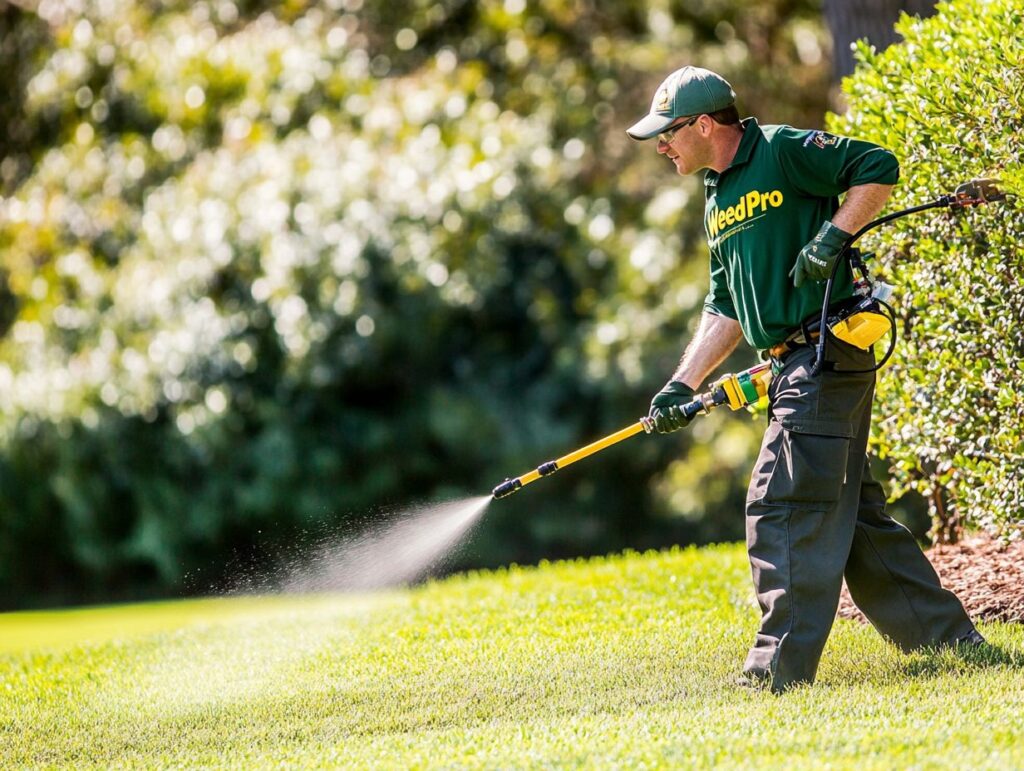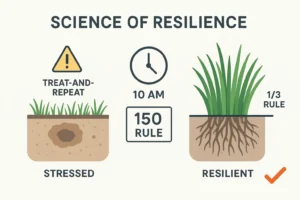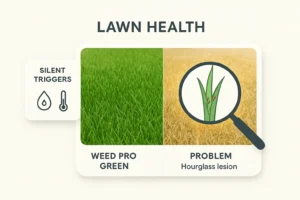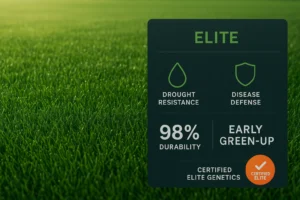Organic is great—until your lawn starts looking like an all-you-can-eat buffet for bugs. In Atlanta, organic pest control has become a go-to for homeowners who want safer, greener solutions for their yards. After all, we all want to protect our families, our pets, and our planet.
But when fire ants invade the backyard barbecue, or chinch bugs chew through your turf, it’s easy to question whether eco pest solutions are up for the challenge.
At Weed Pro, we believe in options—not absolutes. So let’s dive into the truth about organic pest control in Georgia lawns, including what works, what doesn’t, and what your best move might be.
What Is Organic Pest Control, Exactly?
Organic pest control refers to using natural substances or biological methods to prevent or manage pest infestations. That means skipping synthetic chemicals and turning to:
- Essential oils like neem or clove
- Natural insecticide soaps
- Diatomaceous earth
- Beneficial nematodes
- Companion planting and biological predators
These methods are often safer for pollinators, pets, and humans—but they can also come with limitations, especially in Georgia’s unique climate.
Pest Problems in Georgia: Bigger, Bolder, Buggier
Let’s be real: Georgia pests are built differently.
Between the long growing seasons, humidity, and thick warm-season grasses, Atlanta-area lawns create the perfect storm for pests to thrive. Common culprits include:
- Lawn grubs that munch on your turf’s roots
- Chinch bugs that suck grass blades dry
- Armyworms that devastate entire yards in a week
- Mole crickets, sod webworms, fire ants, and more
Add to that overlapping pest cycles in GA, and you’ve got a year-round bug buffet just waiting to happen.
When Organic Isn’t Enough: 5 Common Challenges
1. Low-Potency Pest Sprays = Slow Action
Natural insecticides like neem oil or garlic spray smell great (well, maybe not the garlic), but they’re often low-potency pest sprays. That means it can take multiple treatments—and a lot of time—to see noticeable results.
By then? You might already be dealing with damaged turf from insects that went unchecked for too long.
2. Pest Reinfestation Happens Fast
Organic methods often lack long residual effects. Many break down quickly in sunlight or wash away with rain. That means pests can be back in action just days later, leading to pest reinfestation and repeated yard damage.
And trust us, Georgia bugs don’t need much encouragement.
3. Timing Natural Applications Is Tricky
With natural insecticides, timing is everything. Spray too early, and you might miss the pest’s most vulnerable stage. Spray too late, and they’ve already tunneled in or laid eggs.
Unlike synthetic options that often give you a wider treatment window, timing natural applications requires consistent monitoring and sometimes a little guesswork.
4. Not All Organic Is Safe for Pets—Or Effective
The phrase “safe for pets” gets tossed around a lot—but it doesn’t always mean what you think. Some natural treatments can still irritate your dog’s paws or cause issues if licked. And unfortunately, those that are gentle tend to be… well, ineffective.
The challenge? Striking a balance between safety and strength—without compromising your lawn’s health.
5. Tolerance Only Goes So Far
Organic pest strategies often rely on the idea of “threshold tolerance”—the level of pest activity your lawn can handle without long-term damage.
But in Atlanta, those thresholds are often crossed fast. One week of heavy rain can trigger a grub explosion. A sudden heatwave can spike chinch bug activity. And before you know it, you’re Googling how to reseed your entire backyard.
Sometimes, natural methods simply don’t act fast enough to hold the line.
When Organic Pest Control Does Work
We’re not here to bash going natural. There are plenty of situations where organic pest control makes sense:
✅ Small, early-stage infestations
✅ Preventative maintenance paired with a healthy lawn
✅ Targeted treatments in vegetable beds or pollinator gardens
✅ Homeowners committed to consistent applications and monitoring
In these cases, natural options can support an IPM lawn care strategy—also known as Integrated Pest Management, which blends organic and conventional methods based on pest pressure and risk level.
The IPM Approach: Smart, Balanced Pest Management
IPM (Integrated Pest Management) is a game-changer for Atlanta homeowners who want results without going overboard on chemicals. It focuses on:
- Monitoring pest populations
- Identifying species and life cycles
- Using natural treatments first
- Applying synthetics only when thresholds are exceeded
Here’s how that might look:
| Lawn Issue | First Step | Next Step (If Needed) |
| Mild grub activity | Beneficial nematodes | Targeted synthetic grub treatment |
| Light chinch bug damage | Neem oil or insecticidal soap | Synthetic spot treatment |
| Armyworm outbreak | Soap solution spray | Fast-acting insecticide |
This approach gives your lawn room to breathe naturally—but also a safety net if bugs start throwing a party.
Natural Isn’t the Same as “Do Nothing”
There’s a common myth that choosing organic pest control means doing less. Not true.
In fact, going organic often means doing more—more observing, more spot-treating, more follow-ups, and more frequent product applications.
If you’re ready to roll up your sleeves, it’s totally doable. But if you’re looking for a hands-off fix, going full organic might leave you underwhelmed and overrun.
Let Weed Pro Build a Custom Strategy for Your Atlanta Lawn

At Weed Pro, we don’t believe in one-size-fits-all. Whether you want to stick with organic pest control, go hybrid, or lean toward synthetic for serious infestations, we’ll build a plan that works for your lawn and your lifestyle.
Our team understands pest cycles in GA, and we know how to adapt your treatment schedule to stay ahead—without overdoing it.
We’re here to help your lawn stay strong, green, and grub-free—naturally or otherwise.
👉 Ready to chat about a smarter pest control strategy? Contact Weed Pro today for your custom lawn assessment.
🐛 FAQ: Digging Deeper Into Georgia Lawn Pests
Can planting pest-repelling plants help protect an Atlanta lawn naturally?
Certain plants—like lavender, mint, and marigold—are known to deter specific insects. However, their effect is limited to very small areas and typically doesn’t extend protection across an entire lawn. They’re better suited for garden borders or planters than full-scale turf protection.
How do you know if a pest problem is bad enough to ditch organics?
If you’re seeing consistent turf damage, discoloration, or patchy growth even after organic treatments, it may be time to reconsider your approach. A lawn care professional can assess whether your pest population has crossed the threshold tolerance where action becomes urgent. Waiting too long can make full recovery more difficult and expensive.
Are there any new organic pest control products that are showing promise in Georgia?
Yes, newer formulations using spinosad, a naturally derived bacterial compound, are gaining traction for targeting certain pests like caterpillars and beetles. While promising, they still require multiple applications and may be less effective in high-pressure situations. Always check product labels for region-specific performance data.
👉 Up Next
Bugs and pests aren’t the only issue. Let’s talk about feeding your lawn the right way in our next article: When Organic Lawn Fertilizers Fall Short: Understanding the Gaps.







